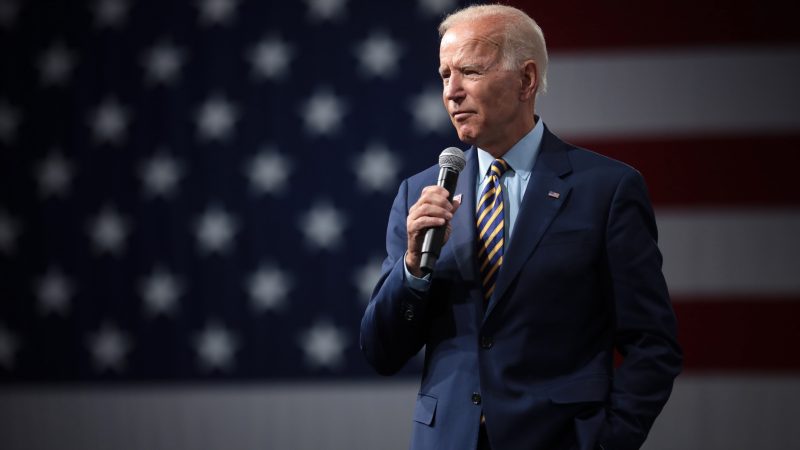
The eyes of the world are on Washington DC. Each inauguration is historic but today’s is uniquely significant, a moment of hope and light after four years of darkness. The Capitol building, which days ago saw fascists seeking to violently overturn an election, will see a peaceful and hopeful transfer of power.
The Trump presidency fuelled dangerous levels of global instability, withdrawing from the Paris agreement on climate change, ramping up tensions with China and wrecking efforts to contain nuclear weapons. The US president attacked and undermined the World Health Organisation, fuelled vaccine nationalism and drove conspiracy theories. Closer to home, he attacked the trans community and met the Black Lives Matter movement with violence. Who will forget the images of caged migrant children separated from their parents in a country built by immigrants?
Finally, this week the world has the chance to turn the page on a dark, divisive era. But while President Trump is leaving office, his toxic legacy is not as easily removed. The attack on Capitol Hill was the culmination of a long campaign to discredit the democratic process by the President and his supporters, stretching back to the growth of the alt-right “patriot” movement in the 1990s, which burst into the open with the Charlottesville riot. The rise of the Tea Party and the selection of Sarah Palin as John McCain’s running mate were part of a steady process through which white supremacy and fascist movements were legitimised and mainstreamed in one of the most powerful democracies in the world.
The UK is not the US. Nevertheless, the parallels are troubling. While seven out of ten US voters opposed the attacks in Washington DC, like the UK, they remain deeply divided on partisan lines. Research by YouGov shows most Republicans supported the attacks as they unfolded. In the US, as in the UK, trust in politicians, the media, institutions and each other has plummeted.
Here in the UK, the Prime Minister has taken his cue straight from the Trump playbook. Just as President Trump stoked tension over Confederate statues in the run-up to the 2017 Charlottesville riot, two years later Boris Johnson tried to start a culture war in the UK over the Churchill statue in Parliament Square. In 2017, Donald Trump used his Twitter account to ban trans men and women from serving in the military. By 2019, Number 10 was polling Northern working-class constituencies to try and ignite a culture war over LGBT rights.
Thankfully these efforts hit a wall. As I wrote at the time, the idea of starting a culture war in northern towns over LGBT rights could only have been dreamt up by someone who has never been to one. Events in the USA suggest there is also ceiling to the disruption and division voters will tolerate. As progressive parties across the world ramp up efforts to call out disinformation and conspiracy theories – from both right and left – the public is responding. By a clear majority, Americans supported the decision by social media companies to ban President Trump from social media. YouGov research shows support in the UK is far higher.
Biden’s victory also stood out in another respect. He stood firm against attacks on the Black Lives Matter movement and thanked the trans community in his acceptance speech. He was clear about his values and clear, too, about his central message, never allowing the Republicans to divert him from his priorities to beat Covid, rebuild the economy and bring America back together again. For many progressive parties around the world, this is the challenge; as the philosopher Michael Walzer once put it: “We have to stand in the centre and on the left at the same time. That may be complicated but it is our historical task.”
For so many people, the Biden/Harris victory felt like a light in the dark, but significant challenges lie ahead. Turning the page on an era in which politicians have stoked hate, fear and distrust to fire their own support base has left deep divisions. In the coming months, expect to see Biden and Harris focus relentlessly on reuniting a divided America – getting a grip on Covid, rebuilding the economy, and taking on decades of economic decline outside of the major cities that have created the conditions in which populists like Donald Trump can thrive.
Stacy Abrams, the inspirational organiser credited with tilting the balance of the Senate, once wrote, “effective leaders must be truth seekers and that requires a willingness to understand truths other than our own”. As we confront the divisions on display in towns, villages and cities across the UK, that is a lesson for our movement. In the angry Twitter debates that have come to define politics, we have lost the ability to understand one another. A Tory government that scapegoats minorities, stokes division, and denies people power in every nation and region will not bring people together. It falls to us to offer something better.




More from LabourList
‘I was wrong on the doorstep in Gorton and Denton. I, and all of us, need to listen properly’
‘Why solidarity with Ukraine still matters’
‘Ukraine is Europe’s frontier – and Labour must stay resolute in its defence’